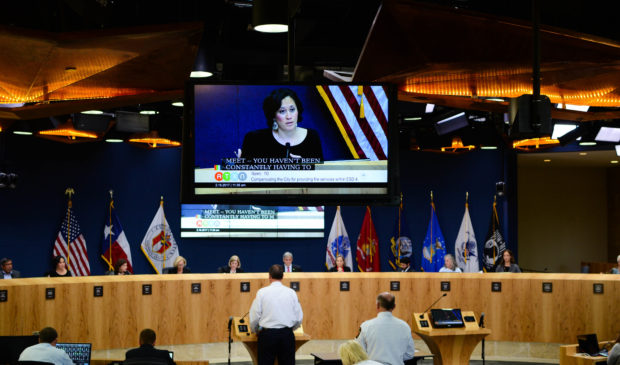Garza, Casar lead plan to use $15M in city reserves for Covid-19 relief programs
Friday, April 3, 2020 by
Chad Swiatecki The city is expected to expand its contracts with social service organizations in order to begin deploying a portion of Austin’s budget reserves to residents facing financial peril due to the spread of Covid-19.
Mayor Pro Tem Delia Garza and Council Member Greg Casar have teamed up to create a budget amendment and accompanying resolution that will likely be posted today to be acted on at next week’s Council meeting.
Garza said the basic criteria already in place to qualify for existing city assistance programs for housing vouchers, food aid and other assistance will serve as the guidelines for the Relief In a State of Emergency (RISE) Fund. The fund is proposed to receive $15 million total, with half directed toward aid programs and the rest for upfront costs for health care services and related equipment that will likely be reimbursed by the federal government.
It is also likely those criteria will be expanded to help those who may be ineligible for federal aid or are having difficulty accessing unemployment funds.
“We want to prioritize people who might not be eligible for federal stimulus money, and that could be because of their employment status or things like not filing tax returns,” she said. “We also don’t want to limit it to only people who fall in the cracks and are eligible for federal aid because even if you’re eligible you haven’t gotten anything yet. Plus there’s the fact lots of people haven’t been able to get the paperwork they need from the Texas Workforce Commission … this is all so unprecedented.”
Garza said one factor likely to come into play in expanding the scope of existing contracts will be the ability of nonprofit groups to offer more services or handle a far higher volume of clients, because of the decreasing availability of volunteers who tend to be older and are demographically at higher risk to experience severe medical issues if they become infected by the virus.
Casar said the budget amendment will call for the budget reserves to be made available for the RISE Fund, with some of the $15 million used for health care services and equipment. The federal government is expected to reimburse municipalities for at least some of those expenses, but Casar said it is unknown how long it will take to receive those funds.
The city currently has $25 million over and above the roughly $140 million reserve amount prescribed by policy calling for a financial cushion of 12 percent of the total budget.
“We know people have needs right now, and with the creation of this fund we’ll use about half of the money we have saved for just this kind of emergency. We need to mobilize help for people immediately,” he said. “There are folks that are having trouble getting access to their unemployment insurance because the lines are overwhelming, and House Democrats just got a memo that some people might have to wait months to receive their relief check from the federal government.”
Council Member Ann Kitchen said she wants to learn from city staff where the biggest anticipated financial gaps are for Austin residents who are at risk of falling behind on living expenses.
“As we look at it we’ll need to think about the breadth of individuals that are hardest hit and that means we need to be sure our programs recognize that, and in some cases may need to be broadened because sometimes we have eligibility requirements that are intentionally narrow,” she said. “We now have a lot of people like artists and musicians and lots of others for whom the bottom has dropped out in terms of income or foreseeable income and we want to make sure whatever we do in terms of the programs we use are broadly stated enough to account for a person’s need.”
This story has been changed since publication to correct the amount of the proposed relief, which is $15 million, not $25 million. Photo by John Flynn, taken when meetings were still being held in person.
The Austin Monitor’s work is made possible by donations from the community. Though our reporting covers donors from time to time, we are careful to keep business and editorial efforts separate while maintaining transparency. A complete list of donors is available here, and our code of ethics is explained here.
You're a community leader
And we’re honored you look to us for serious, in-depth news. You know a strong community needs local and dedicated watchdog reporting. We’re here for you and that won’t change. Now will you take the powerful next step and support our nonprofit news organization?










